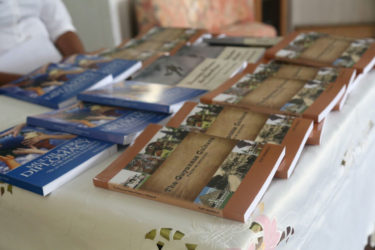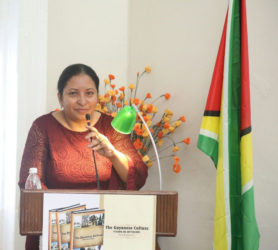“If democracy in Guyana is to be fully implemented we need statesmen and women who look to future and who can give us a vision of solidarity and unity we can support. We cannot live in a society so muddled with personal concerns,” this sentiment was expressed by Rudy Insanally, former foreign minister and Chancellor of the University of Guyana, at the launch of his new book: The Guyanese Culture — Fusion or Diffusion?
In the 20 chapters and 200 pages of his third book, Insanally traces the evolution of Guyanese culture from the days of colonialism and slavery to the present time and examines the harm done by slavery and indentureship to our nation’s psyche, highlighting the way in which the colonial policy of ‘divide and rule’ was used to gain support from the two main ethnic groups: African and Indian Guyanese.

He cites the past 50 years of sovereignty marred by social instability and violence and concludes that the possibility of any further cultural integration appears remote unless “the ghosts of slavery and indentureship are exorcised from the society.”
Presenting a review of the book Dr Paloma Mohamed noted that it was well crafted and spoke to many decades of Insanally’s diverse experiences.
“The value of the book is his experiences: what he has worked on, seen and believes… while not a deeply historical book in the sense that it was written by a historian, it is deeply historical from a personally place [as] the book like Insanally brings together in a systemic way his thoughts and experiences as well as references to important documents such as the Moyne Commission report which he has worked on,” Mohamed explained.
She noted that in each chapter he not only details problems, but offers solutions while examining a complex concept.

She stressed that someone looking for a detailed examination of art and literature would not find it here as 10 of the 20 chapters are spent exploring different types of culture such as political and economic.
She said Insanally sees race and race relations as central to solving problems of Guyanese society and central to its cultural problems, though she cautioned that the narrative which solely credits external forces with instigating these problems is an incomplete analysis.
She praised his identification of the nation’s identity complex which needs to be resolved both at personal and societal level.
“Most Guyanese will contend that no true racial hatred exist… They often cite peaceful and harmonious relations between African and Indians before independence… [But] our current reality is that despite all out symbols of sovereignty Guyana is to the foreign eye a collection of tribes rather than a nation.
We are often perceived a crabs in a barrel each pushing the other down in order to reach the top; very often the racism is subtle and silent but visible to the trained eye..,” she quoted the book as saying before noting that Insanally is a patriot whose newest book is an erudite compendium of how Guyana can be made a better place.








